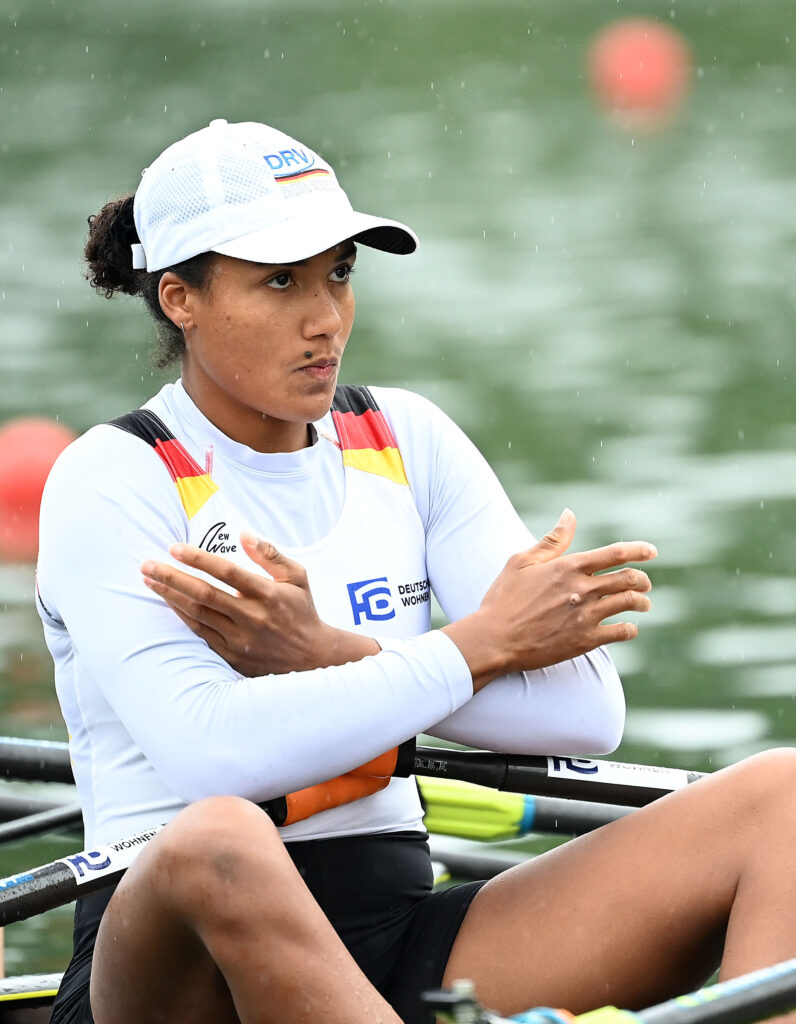
09 Aug 2021
August 2021 : Carlotta Nwajide
Rower of the Month – August 2021
Carlotta Nwajide had just fulfilled a dream she’s had since she first started rowing – to go to an Olympic Games. Nwajide achieved this in Tokyo. She was part of the German women’s quadruple sculls that came fifth. Posting on social media after the race, Nwajide was shocked that they broke a boom with just 150 metres to go. Earlier in the season the quad had won two World Cup golds and a silver. We spoke to Nwajide just before the Tokyo competition started.
World Rowing: How has it felt to be racing again this year?
Carlotta Nwajide: It feels great to be able to compete again. Due to the long break, I was a bit nervous before our season started and it took us some races until we got into shape. Nonetheless it feels just great that we can race again. I really missed the regatta feeling.
WR: How were you feeling going into the Olympics this year, and how is it different to what you imagined before the pandemic?
CN: I am just very happy that the games hare taking place. It’s my first Olympics. Even though everything will be a bit different than it would be without the pandemic I think going to the Olympic Games is always an incredible experience. Up until now being here is just an amazing feeling you only can experience when you are here.
WR: Why did you take up rowing – and why do you still do it?
CN: I took up rowing because my friends at secondary school wanted to try out our school’s team. Rowing was the first sport I was good at, so I stayed. I quite quickly set a goal of competing at World Championships and the Olympic Games. I think I was 12 or 13 when I first thought about competing at the Olympics. That dream has always been my motivation to stick with rowing.
WR: What is your role in the quad?
CN: I’m the three seat, so I really have to be patient about how Frieda (Haemmerling), our stroke, wants the boat to run. I always try to feel what she wants and support her with my strength so that the two behind us exactly know what to do. Off the water I am responsible for the fun. At least in my opinion.
WR: Where is your favourite place to train?
CN: My favourite training location definitely is Weissensee in Austria. We go there on training camp every year before the world championships. Once you have seen a picture of the place, you know why it is so great.
WR: What causes are you an activist for and what form does your activism take?
CN: I think as an athlete you have a great platform and a voice that can be heard. People always say that as athletes we are role models but, in my opinion, it is not just about winning the medals or working hard every day to become better in what you are doing.
Every one of us is a human being and I think there are things in life which are more important than the sport you do. For me social inequality is one of the most unfair things in life. I just want to be part of making a change because there always have been and always will be people who fought to improve the lives of oppressed groups.
Besides the sport, I am working on different projects. I would say my main topic is intersectional anti-racism. Also, the climate crisis is a topic which is very important to me. Especially because as an athlete who lives in the global north, I have a high impact on climate change, which makes me sad actually.
Together with the German lightweight rower Fini Sturm I founded the “Ruderwald” (Rowing Forest) which is a reforestation project to compensate the greenhouse gas emissions of our team. Our main goal is to raise awareness about the climate crisis and to show that we as athletes can contribute to it. We are aware that it takes more than just paying money and carrying on as before. However, we see the “Ruderwald” as one important step of many actions and as a good way to take responsibility for the emissions we have caused during our flights to training camps and competitions.

WR: Does being a rower help your activism and vice versa?
CN: As an Olympic athlete you automatically get more attention than as a non-athlete so I would say yes, definitely. And on the other side I enjoy the activism as a balance besides the sport.
WR: Are you a full-time rower or do you study/work too?
CN: I would say I am a full-time rower but besides I am a geography student and I am applying for social sciences this fall. Also, I am in the high performance athletes programme of the German Army (Bundeswehr) where my work consists of training.
WR: What do you do for fun?
CN: There are so many things I could list now. For me the most important thing is to stop thinking about training in my free time. I have the feeling that then I can enjoy everything I do more. And to have fun quickly, I prefer to spend time with my friends.
WR: Which sportsperson do you most admire?
CN: I would say there is no specific sportsperson I admire most. I’m impressed by every successful athlete but what is more interesting for me is the person behind the athlete. I am always impressed when people think further and talk about issues that are important to them besides the sport.

